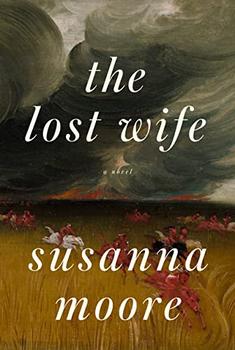Summary | Excerpt | Reviews | Beyond the book | Read-Alikes | Genres & Themes | Author Bio

 Book Reviewed by:
Book Reviewed by:
Rebecca Foster
Buy This Book
The Lost Wife is a hard-hitting novella based in part on a white settler named Sarah Wakefield's memoir Six Weeks in the Sioux Tepees: A Narrative of Indian Captivity. In Susanna Moore's version of Wakefield's story, which opens in 1855, Sarah is a 25-year-old wife and mother who leaves her baby daughter, Florence, behind when she flees her abusive husband. She travels from Rhode Island to Minnesota Territory (encompassing present-day Minnesota and much of the Dakotas), where she hopes to meet up with an old friend and start a new life. Telling no one about her past, she marries Dr. John Brinton. The story then jumps forward to 1862, when Brinton is the doctor on a Sioux reservation and they have two children, four-year-old James and two-year-old Anne.
Although the Civil War is unfolding in the background, the greater threat in the territory is of a revolt by the Indigenous residents. Dr. Brinton disapproves of settlers stealing land from the Dakota people (one of several tribes that make up the Sioux Nation), but his is a rare voice of dissent. The U.S. government has promised the Dakota payment and food in exchange for land, but deliveries are late and scarce, and there is genuine risk of starvation.
Meanwhile, Sarah spends her afternoons smoking and gossiping with the Native women, learning some of their language and teaching their children the English alphabet. "I live in two worlds now," she notes, "My life is a combination of fairy tale and newspaper report." Sarah can be wry but also incisive as she comments on notions of refinement: "The idea of who is civilized and who is not seems to refer to many things, religious customs, and what stories we tell, and the way food is prepared, and how the defeated in battle are treated. Even table manners."
Amid increasing fears of rebellion and an attack on the local fort, Dr. Brinton sends Sarah away with the children, thinking this offers their best chance of safety. Instead, they are captured almost immediately and, in the following weeks, held in various Dakota encampments. There are constant rumors that they will be killed. Sarah hears of female captives being raped, and whenever they move camp she observes burned settlements and the bodies of the slain. She has completely assimilated at this point, wearing Dakota dress and speaking the language. Is this why her family has been spared thus far?
Sarah's telling is so matter-of-fact that threatening or climactic scenes lose some of their potential gravity. However, this is a boon when the reality is almost too horrific to abide: "Some of the dead had been shot in the face and some had been scalped, and it was hard to distinguish their features. Some of the corpses that had not been chewed by animals or gnawed by insects had burst open."
Moore has Sarah withhold some of the truth about her past, and it is up to us to read between the lines. For instance, a woman notices scars on Sarah's wrists and, although Sarah makes up an excuse, it's clear that they're evidence of a long-ago suicide attempt. The harshness of her earlier life – doing grueling farm labor as a child and then being a victim of domestic violence – has perhaps inured her to some of the horrors of war.
A Native woman tells Sarah the Dakota legend that gives the book its title. The lost wife ran away from her cruel husband and joined a wolf pack. When her people found her a year later, she could hardly bear to reenter human society, but nor could she stay with the wolves. It's a perfect allegory of Sarah's predicament, not totally comfortable in either white settler or Dakota company. Although some might suspect that she succumbed to Stockholm syndrome, she is in fact distressed by the brutality on both sides. The novel is illuminating on the history of the U.S.-Dakota War of 1862 (see Beyond the Book), which was doomed because money and power were on the government's side; "[V]ictory was never the point," Sarah realizes, but, rather, righteous rebellion.
There is much that is of anthropological and historical interest here. Despite the book's small page count, Moore conveys ample information about settler mores in the mid-19th century – "[I]t was Jane Austen who taught me how to write a thank-you letter," Sarah writes – as well as Native American rituals such as the Sun Dance, and natural wonders like a flock of passenger pigeons (which have since gone extinct) darkening the sky. She also testifies to timeless phenomena: addiction, mental health issues and the cycles of misogynistic and racial violence.
At heart, this is a story about survival, and about a mother desperately trying to protect her children and reconnect with the daughter she had to leave behind. The flat storytelling, which may represent a pastiche of period style, could limit reader engagement. Still, it is a vivid account of a lesser-known aspect of the country's war history, putting Indigenous people's suffering at the center. It is also a valuable critique of the American West, and what one character calls its "myth of innocence and abundance."
![]() This review
first ran in the May 17, 2023
issue of BookBrowse Recommends.
This review
first ran in the May 17, 2023
issue of BookBrowse Recommends.

If you liked The Lost Wife, try these:

by Jane Smiley
Published 2023
From the beloved Pulitzer Prize-winning and best-selling author of A Thousand Acres: a rollicking murder mystery set in Gold Rush California, as two young prostitutes follow a trail of missing girls.

by Téa Obreht
Published 2020
The New York Times bestselling author of The Tiger's Wife returns with a stunning tale of perseverance - an epic journey across an unforgettable landscape of magic and myth.




No pleasure is worth giving up for the sake of two more years in a geriatric home.
Click Here to find out who said this, as well as discovering other famous literary quotes!
Your guide toexceptional books
BookBrowse seeks out and recommends the best in contemporary fiction and nonfiction—books that not only engage and entertain but also deepen our understanding of ourselves and the world around us.